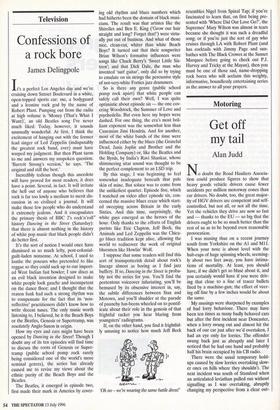Television
Confessions of a rock bore
James Delingpole
It's a perfect Los Angeles day and we're cruising down Sunset Boulevard in a white, open-topped sports car: me, a bodyguard and a leonine rock god by the name of Robert Plant. Pumping out from the radio at high volume is 'Money (That's What I Want)', an old Beatles song I've never much liked. Today, however, it sounds unusually wonderful. At first, I think the excitement of hanging out with the former lead singer of Led Zeppelin (indisputably the greatest rock band, ever) must have warped my judgment. But then Plant turns to me and answers my unspoken question. 'Barrett Strong's version,' he says. 'The original and still the best.'
Incredibly tedious though this anecdote will have proved for most readers, it does have a point. Several, in fact. It will irritate the hell out of anyone who believes that rock is far too lowly a medium to merit dis- cussion in so civilised a journal. It will make those few people who do understand it extremely jealous. And it encapsulates the primary thesis of BBC 2's rock'n'roll' history Dancing in the Street (Saturday): that there is almost nothing in the history of white pop music that black people didn't do better first.
It's the sort of notion I would once have dismissed as so much lefty, post-colonial- guilt-laden nonsense. At school, I used to loathe the poseurs who pretended to like reggae so they could suck up to our import- ed West Indian fast bowler; I saw disco as an evil black invention designed to make white people look gauche and incompetent on the dance floor; and I thought that the reason funk had such a strong rhythm was to compensate for the fact that its 'non- reflective' practitioners didn't know how to write decent tunes. The only music worth listening to, I believed, be it the Beach Boys or the Beatles, Genesis or Supertramp, was resolutely Anglo-Saxon in origin.
How my eyes and ears might have been opened by Dancing in the Street! Though I doubt any of its ten episodes will find time to discuss the roots of Genesis or Super- tramp (public school pomp rock rarely being considered one of the world's more seminal genres), the series has already caused me to revise my views about the ethnic purity of the Beach Boys and the Beatles.
The Beatles, it emerged in episode two, first made their mark in America by cover-
mg old rhythm and blues numbers which had hitherto been the domain of black musi- cians. The result was that artistes like the Shirelles and Ben E. King ('Grow our hair straight and long? Forget that!') were virtu- ally put out of business. And what of those nice, clean-cut, whiter than white Beach Boys? It turned out that their songwriter Brian Wilson's formative influences were songs like Chuck Berry's 'Sweet Little Six- teen'; and that Dick Dale, the man who invented 'surf guitar', only did so by trying to emulate on six strings the percussive style of not-very-white Forties jazz drummers.
So is there any genre (public school pomp rock apart) that white people can safely call their own? Well, I was quite optimistic about episode six — the one cov- ering Woodstock, the Summer of Love and psychedelia. But even here my hopes were dashed. For one thing, the era's most bril- liant exponent was the somewhat less than Caucasian Jimi Hendrix. And for another, most of the white bands of the time were influenced either by the blues (the Grateful Dead, Janis Joplin and Brother and the Holding Company) or, like the Beatles and the Byrds, by India's Ravi Shankar, whose shimmering sitar sound was thought to be the perfect complement to an LSD trip.
By this stage, I was beginning to feel somewhat inadequate beneath that pale skin of mine. But solace was to come from the unlikeliest quarter. Episode five, which I watched on video after episode six, con- cerned the massive blues craze which start- ed sweeping across Britain in the early Sixties. And this time, surprisingly, the white guys emerged as the heroes of the hour. Only thanks to the efforts of English purists like Eric Clapton, Jeff Beck, the Animals and Led Zeppelin was the Chica- go blues tradition kept alive, allowing the world to rediscover the work of original bluesmen like Howlin' Wolf.
I suppose that some readers will find this sort of trainspotterish detail about rock's lineage almost as boring as I fmd jazz buffery. If so, Dancing in the Street is proba- bly not the series for you. You'll find the portentous voiceover infuriating, you'll be bemused by its obsessive interest in, say, the subtle differences between Stax and Motown, and you'll shudder at the parade of paunchy has-beans wheeled on to pontif- icate about their role in the genesis of that frightful racket you hear blaring from youngsters' radiograms.
If, on the other hand, you find it frightful- ly amusing to notice how much Jeff Beck 'Oh no - we're wearing the same battle dress!' resembles Nigel from Spinal Tap; if you're fascinated to learn that, on first being pre- sented with 'Where Did Our Love Go?', the Supremes' Mary Wilson was almost in tears because she thought it was such a dreadful song; or if you're just the sort of guy who cruises through IA with Robert Plant (and has cocktails with Jimmy Page and sun- bathes with The Black Crowes at the Sunset Marquee before going to check out P.J. Harvey and Tricky at the Mayan), then you must be one of those sad, name-dropping rock bores who will acclaim this weighty, informative, boundlessly entertaining series as the answer to all your prayers.


































































 Previous page
Previous page